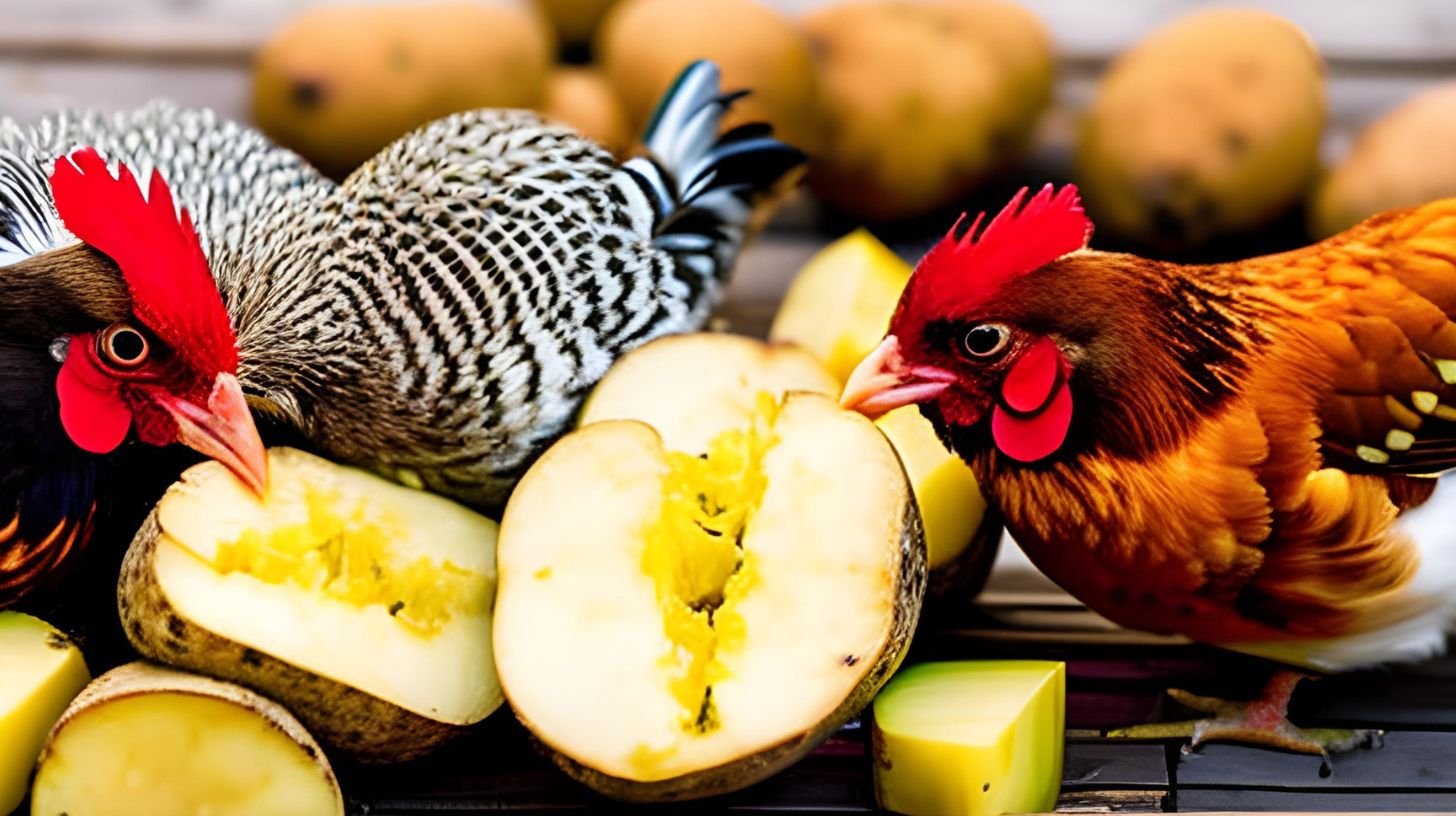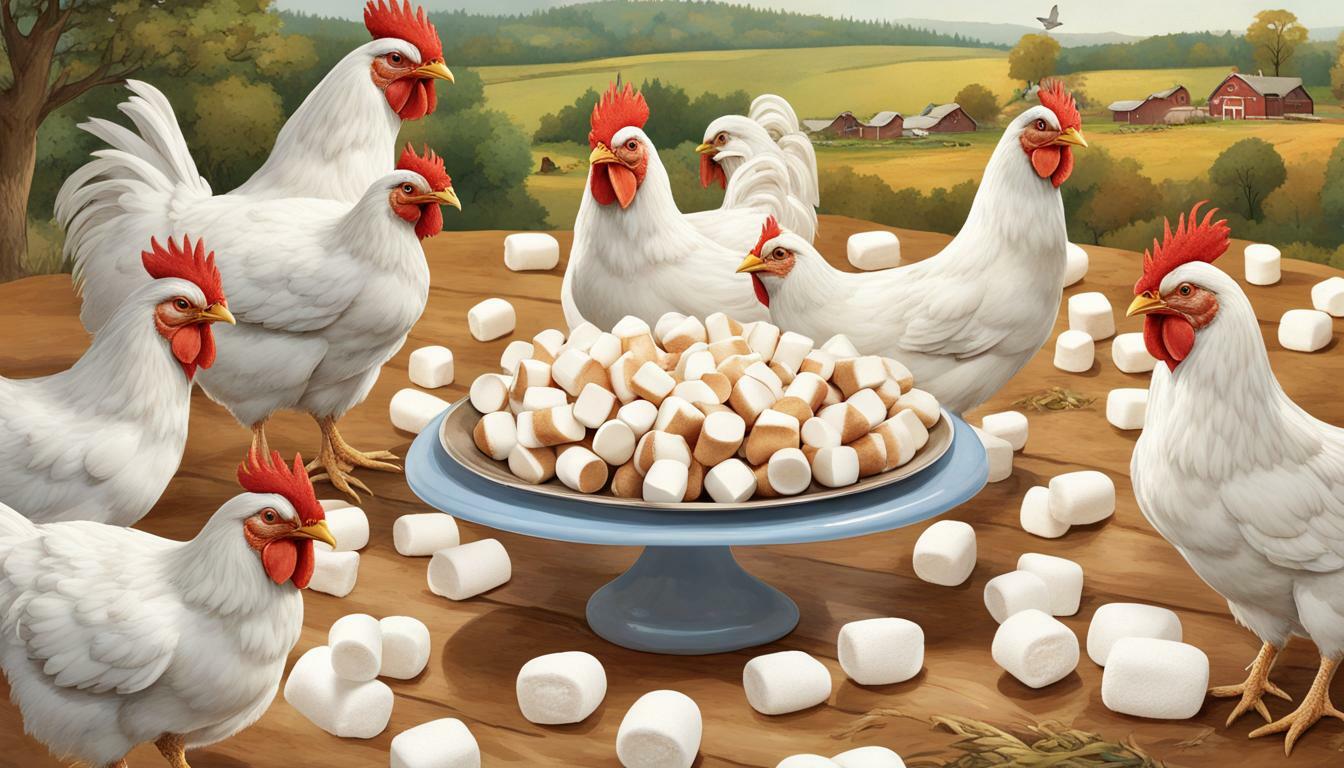Can Chickens Eat Potatoes? Consumption for Your Flock

Daftar isi:
Chickens are one of the most common poultry animals raised on small farms and backyard coops. As chickens become more popular as pets and for small-scale food production, their nutritional needs also become more important to understand. Many people wonder if chickens can eat common human foods like potatoes. Potatoes are starchy vegetables that are a staple starch in many diets around the world. But is it safe and healthy to feed potatoes to chickens?
Can Chickens Digest Raw Potatoes?
Potatoes are an energy-dense source of carbohydrates and starches. But some people claim potatoes are difficult for chickens to digest. There are a few reasons why raw potatoes may cause digestive upset in chickens:
- Starchiness – Potatoes have a high starch content, which can be difficult for chickens to break down without the help of cooking or mashing. Too much raw starch can lead to diarrhea or constipation.
- Solanine – Potatoes contain a small amount of solanine, a toxin that is concentrated in green potatoes and eyes/sprouts. Solanine is poorly digested and can irritate the digestive tract.
- Lack of protein – Potatoes have very little protein, which chickens need in their diet for maintenance, growth, and egg production.
Due to these concerns, many backyard chicken owners recommend against feeding raw potatoes to chickens, especially as a significant portion of their diet. The indigestible starches and solanine found in raw potatoes makes them poorly suited for a chicken’s digestive system.
However, feeding cooked potatoes in moderation seems to be fine. The cooking process breaks down much of the raw starch, making digestion easier on the chicken.
Benefits of Feeding Potatoes to Chickens
While potatoes may not be the perfect food for chickens, they do have some nutritional value when fed properly:
- Carbs for Energy – The starch in potatoes provides a dense source of carbohydrates for energy. Potatoes are about 80% carbs by weight.
- Vitamin C – Potatoes have a high amount of vitamin C, an important antioxidant. Vitamin C supports immune function and growth.
- B Vitamins – Potatoes contain small amounts of B vitamins like vitamin B6, niacin, and folate. B vitamins help metabolic functions.
- Minerals – Potatoes contribute trace minerals like iron, magnesium, zinc and phosphorus. Iron supports blood health.
- Water Content – Cooked potatoes have a high water content, which can help keep chickens hydrated.
Overall, potatoes make a decent supplemental treat or snack for backyard chickens. They provide some key nutrients and energy. Just be sure to cook the potatoes first to break down indigestible starches.
Feeding Cooked vs. Raw Potatoes to Chickens
The debate over potatoes for chickens comes down to feeding them cooked vs. raw. Which is better?
Cooked potatoes are recommended over raw for a few reasons:
- Easier to Digest – Cooking breaks down starch molecules so they are easier for a chicken to process without digestive upset.
- No Solanine – Cooking also destroys solanine, the mild toxin found in potato eyes and skins. Avoid feeding potato greens.
- Increased Nutrient Absorption – Chickens can access more beneficial nutrients from cooked potatoes as they are more bioavailable.
- Moisture Content – Cooked potatoes have a higher moisture content versus raw, helping to meet a chicken’s fluid requirements.
Many chicken owners note that their birds have no issue digesting mashed or baked potatoes. The cooking process seems to overcome the digestive challenges of raw potatoes.
On the other hand, raw potatoes come with some risks:
- Gastrointestinal Issues – Too much raw starch and solanine can irritate the gut, causing diarrhea or other problems.
- Reduced Nutrient Absorption – Antinutrients in raw potatoes may limit how much protein, vitamins and minerals a chicken actually absorbs.
- Higher Risk of Spoilage – Raw potato scraps may also spoil faster than cooked.
In general, cooked potatoes are a safe, nutritious snack for chickens in moderation. Raw potatoes are more problematic. Still, some backyard chicken raisers report success offering small amounts of shredded raw potatoes to their flock too. Monitor your chickens when feeding raw potatoes and discontinue use if any digestive issues emerge.
How to Feed Potatoes to Chickens
If you want to feed potatoes to your backyard chickens, there are some best practices to follow:
- Cook potatoes first – Boiling, baking, or mashing potatoes helps make them safer and easier to eat for chickens.
- Remove peels – Peels seem harder for chickens to digest, so peel potatoes before cooking or mashing for your flock.
- Dice into small pieces – Cut cooked potatoes into very small 1/4 inch cubes or shreds that are easy for chickens to swallow.
- Avoid green potatoes – Do not feed potatoes that are sprouting or have a greenish tinge, as they contain more of the toxic solanine.
- Mash for chicks – Young chicks may have difficulty eating whole pieces. Mash cooked potatoes into a soft texture for chicks to safely eat.
- Limit potato scraps – Potato scraps and peels should only be a small part of a balanced chicken diet, not their main food source.
- Remove uneaten portions – Remove any uneaten potato after 30-60 minutes to prevent rotting.
By following these tips, you can safely incorporate limited potato scraps into your backyard chicken’s diet. Be sure to monitor the chickens after feeding potatoes for any signs of digestive upset.
When Feeding Potatoes to Chickens
While cooked potatoes are safe for chickens in moderation, there are some potential downsides to be aware of:
- Digestive distress – Too much raw potato or solanine-rich peelings can upset a chicken’s stomach, causing diarrhea.
- Crop impaction – Potatoes may not break down fully in a chicken’s crop. Impaction can be life-threatening.
- Nutritional deficiencies – Potatoes lack key nutrients chickens need like protein, vitamins A, D, E and K. Relying solely on potatoes could lead to deficiency.
- Weight gain – The starch in potatoes is very energy dense. Feeding too many potatoes could lead to obesity in confined chickens.
- Internal parasites – Improperly composted potato waste may contain parasites. Only feed fully cooked table scraps.
- Increased egg yolk color – Excessive yellow/orange foods like sweet potatoes may lead to more vibrant egg yolks, if aesthetics matter to you.
While potatoes fed properly in moderation seem safe for most backyard chickens, each bird is unique. Monitor your flock when introducing new treats. Discontinue any food that seems to cause stomach upset or other issues. No one food should make up the bulk of a balanced chicken diet.
Types of Potatoes for Chickens
Not all potatoes are created equal when it comes to feeding chickens:
Best Potato Varieties for Chickens
- Russet potatoes – Fluffy texture is easy to break down when cooked.
- Red potatoes – Moist and slightly waxy, providing variety.
- Yellow potatoes – Sweet potatoes offer more nutrients like vitamin A and potassium.
- Mashed potatoes – Mashing any potato variety makes it easy for chickens to digest.
Worst Potato Varieties for Chickens
- Raw potatoes – Raw potatoes are too hard for chickens to break down.
- Green potatoes – Contain higher, toxic levels of solanine.
- Potato eyes and sprouts – Have an even higher concentration of glycoalkaloids.
- Baked potatoes – More difficult for chickens to digest without mashing.
- Potato peels – Peels seem to cause more digestive upset and are hard to break down
Stick to well-cooked russet or red potatoes. Avoid any greening or sprouting potatoes. If in doubt, mash or shred the potatoes before feeding to your flock.
How Much Potato Should Chickens Eat?
Moderation is key when feeding potatoes to chickens. Follow these serving guidelines:
- Start Slowly – Introduce potatoes gradually to observe any adverse reactions.
- Limit to Treats – Potatoes should only supplement a chicken’s primary feed, not act as staple diet.
- Feed Cooked Scraps – Leftover mashed or fried potatoes are safer to feed than raw potatoes.
- Small Servings – Feed only as much as chickens will eat in one sitting, about 1⁄4 to 1⁄2 cup max per chicken.
- 1-2 Times Per Week – Limit potato scraps to just 1 or 2 times per week to prevent health issues.
- Free Feed Greens – Ensure chickens also have access to grass, sprouted grains, cabbage or other greens.
- Provide Grit – Supply insoluble grit to help grind up fibrous potato shreds in the gizzard.
While the occasional potato treat is fine, chickens should not eat potatoes daily or in large amounts. Follow suggested serving sizes and frequencies to prevent nutrition and digestive issues.
FAQ About Can Chickens Eat Potatoes?
Here are answers to some common questions about feeding potatoes to chickens:
Can chickens eat potato skins?
Chicken owners seem divided on this issue. Potato skins may be difficult for chickens to digest fully. Peel potatoes if possible before cooking or mashing to reduce any skin-related digestion issues.
Can chickens eat raw potatoes?
While chickens “can” eat raw potatoes, cooking the potatoes first is recommended. Raw potatoes contain more indigestible starches and solanine that may upset a chicken’s stomach. At minimum, shred or mash any raw potatoes fed to chickens.
Can chickens eat sweet potatoes?
Yes, chickens can eat sweet potatoes. Their slightly higher moisture and vitamin A content makes sweet potatoes a good occasional treat. Still limit feedings and cook the sweet potatoes before feeding.
Can baby chicks eat potatoes?
Young chicks should not eat whole pieces of potato as they present a choking risk. Mash or shred cooked potatoes into tiny pieces or a wet mash that chicks can safely consume. Avoid raw potatoes for chicks.
Can chickens eat potato chips?
Avoid feeding chickens potato chips, fries or other greasy potato products. The high fat, salt and seasoning content are unhealthy for chickens. Even plain chips are deep fried at high heat, creating harmful free radicals.
What about green potatoes?
Never feed chickens potatoes that are sprouting or have a green tinge. These contain toxic levels of solanine that can seriously harm chickens. Stick to properly stored white/yellow potatoes within only a few days of purchase.
Conclusion
Can chickens eat potatoes? In moderation, safely cooked potatoes can provide a nutritious supplemental treat for backyard chicken flocks. With proper preparation and feeding frequency, potato scraps can be a safe, inexpensive way to offer your chickens variety in their diet.
Just be sure not to overdo potato treats, and always feed them cooked, diced and in reasonable portion sizes. Enjoy supplementing your flock’s feed with occasional potato snacks for a happy, healthy backyard chicken diet.
Welcome. I’m Adreena Shanum, the proud owner of this website, and I am incredibly passionate about animals, especially poultry. I founded adreenapets.com as a labor of love, stemming from my desire to share my knowledge and experiences with poultry enthusiasts worldwide.




